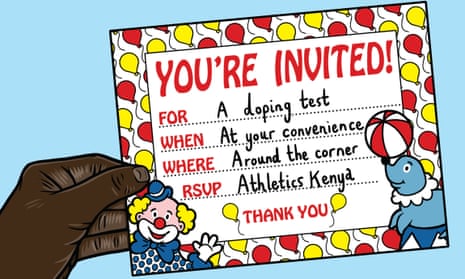Something magical occurs in Kenya’s Rift Valley shortly after dawn: dozens of elite athletes suddenly appear into thin air. Quickly they start weaving between cattle and corrugated shacks, past rusting trucks belching out the consequences of 30 years’ bad refuelling habits. It makes for a very different sort of rush hour.
The effect is mesmerising. The last time I was in Iten, which proudly bills itself as “the home of champions”, I saw David Rudisha gliding down a steep hill, followed by a posse of schoolboys giving chase – a scene straight out of Rocky. But with so many top runners sucking up the benefits of high altitude, and tackling the valley’s hills as if on travelators, such sights are not unusual.
Most sports scientists and close observers I speak to believe that the overwhelming majority of Kenya’s world-class athletes are doing it the right way, and can be trusted. Sadly, the country is rapidly losing the right to be given the benefit of the doubt.
Rewind over the past few days. It was worrying enough that the World Anti-Doping Agency has put Kenya on probation for failing to tackle its drug problems. But the claims by two athletes, Joy Sakari and Francisca Koki Manunga, that they were asked for bribes by the Athletics Kenya CEO, Isaac Mwangi, in exchange for a reduction in their four-year bans could be catastrophic.
Mwangi has called the allegations, which the Anti-Doping Agency of Kenya is investigating, “a joke”. But they leave Athletics Kenya battling on multiple fronts. Last November detectives questioned three of the most senior officials of the old regime over claims they had secretly pocketed close to $700,000 (£460,000) from its main sponsor, Nike. More pertinently, this toxic potion of doping, corruption and bribery sounds horribly familiar. We have heard it before, in Russia.
Of course Kenya is not Russia. There are no whispers of state-sponsored doping – instead the problem is more state-sponsored incompetence. For despite Wada’s gravest threats, the Kenyan government is still failing to stump up £3.5m to fund and staff anti-doping efforts. It makes the testing regime lax to the point of nonexistence. But perhaps the solution required is a familiar one from Wada’s Russian playbook: a new meaty and forensic Wada independent commission, this time into Kenya.
It has at least one prominent supporter: Richard Ings, the former head of the Australian Anti-Doping Agency, and a widely respected authority on drugs in sport. “The allegations we are now hearing from Kenya are scarily similar to the facts uncovered in Russia,” he says. “It is impossible for domestic anti-doping agencies in poorly resourced countries, such as Kenya, to do a proper job. These damaging allegations are no less worthy of an independent commission than Russia.”
But even this is not enough. Last week the Canadian runner Reid Coolsaet, who is training in Kenya, tweeted: “Kenyan-style anti-doping test. Notify us the night before. One-hour drive to test site at 5am. Many Olympic medallists in house. It was an IAAF accredited test. Procedures are far from what I’m used to in Canada.”
By giving advance notice, it turns an already porous drug-testing programme into one with gaping holes: an athlete who has recently taken a banned drug can simply not turn up for the test. Yet his experience is not unusual. In Iten, I heard stories of athletes being told weeks in advance when to attend the testing centre in Eldoret.
More worryingly, Coolsaet’s tweet also highlighted the fact that even the IAAF, world athletics’ governing body, is not testing to the highest standards when in Kenya. Once again, the need for a vastly beefed-up team of investigators and testers, to enter suspicious countries and dig until they find where the bodies are buried, seems essential.
Indeed, senior anti-doping experts are calling for this. As professor Christiane Ayotte, the director of the Wada-approved laboratory in Quebec, puts it: “The first thing that needs to happen is the investigation into Russia should be extended to other countries. Wada has also asked for its budget to be extended to improve investigations, which is essential too.”
Understandably, she will not be drawn into naming names. But a good rule of thumb, she says, is to look at those countries low in the Corruption Perception Index and high in the medal table.
An independent commission into Kenya would not be slurring all the country’s athletes. I suspect a great many are clean. But that is based on faith and friendships – a poor substitute for hard evidence.
David Epstein, the author of The Sport’s Gene, attributes Kenya’s success to a “perfect storm of nature and nurture”. One tribe – the Kalenjin – make up just 12% of Kenya’s population, but are responsible for the vast majority of elite distance runners. They live at just the perfect altitude for training, and tend to have long limbs relative to their body size with very narrow outer extremities, which helps their running economy.
Epstein also told me that the most persuasive research on the physiology of running economy was done on Kalenjin children. As he points out, presumably they were not doping. But it is an inescapable fact that over 40 Kenyan athletes have tested positive since 2012. How many more are out there? Your guess is as good as mine. But isn’t it about time we got a better idea?

